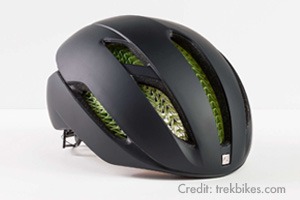Controversy Surrounding Trek’s WaveCel Helmet

A controversy is brewing regarding Trek and their new WaveCel helmet technology—as opinions differ on how to best determine if the construction is as effective as the manufacturer claims it to be. A detailed article on the device and the technology behind it is available here.
The Claims
Trek recently introduced a new helmet. The offering combines conventional EPS foam, a low-density lattice structure dubbed WaveCel, and an outer plastic shell.
According to Trek, WaveCel both shears laterally and compresses in an impact. To support the launch, Trek released a study claiming WaveCel is up to 48 times more effective at concussion prevention than EPS alone.
The Science
In an impact, EPS foam compresses to absorb linear-impact energy. It does not dissipate rotational energy created when a rider’s head twists quickly. Such energy can cause rapid brain movement inside the skull, potentially leading to a concussion.
To alleviate the problem, systems such as the Multi-Directional Impact Protection System (MIPS) allow the helmet to rotate. Trek claims WaveCel addresses linear impact and rotational energy—something it says competitors cannot.
The Controversy
WaveCel was created by Legacy Biomechanics Laboratory. Their team—led by an engineer with a background in orthopedics and biomechanics—spent six years on the technology.
The team—in conjunction with the University of Strasbourg’s Institute for Fluid and Solid Mechanics in France—published their findings in Accident Analysis and Prevention, a peer-reviewed journal.
Some competitors including MIPS and Koroyd—another manufacturer of low-density cellular structures for use in protective gear—say their own independent testing has proven unable to effectively replicate Trek’s claims.
At the same time, testing showed systems like MIPS also lowered the risk of concussion—though not to the same degree Trek claims of the WaveCel product.
We’ll See You On the Road.
If you have any questions about cycling safety, bike law, insurance, or a bicycle accident you were involved in, contact Attorney Thomas Henson of Bike Lawyer NC by filling out a free consultation form or calling him at 919-781-1107.
As a cycling enthusiast and a Personal Injury Attorney for 30 years, Thomas understands the unique risks cyclists face on the road and would like to educate and help fellow cyclists in any way he can.
Henson Fuerst/Bike Lawyer NC — Representing North Carolina Cyclists
